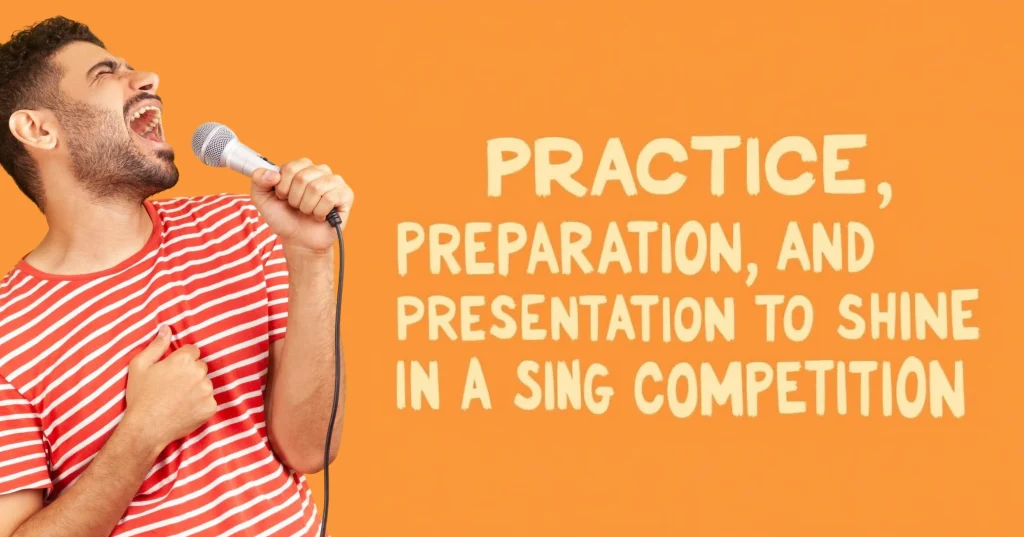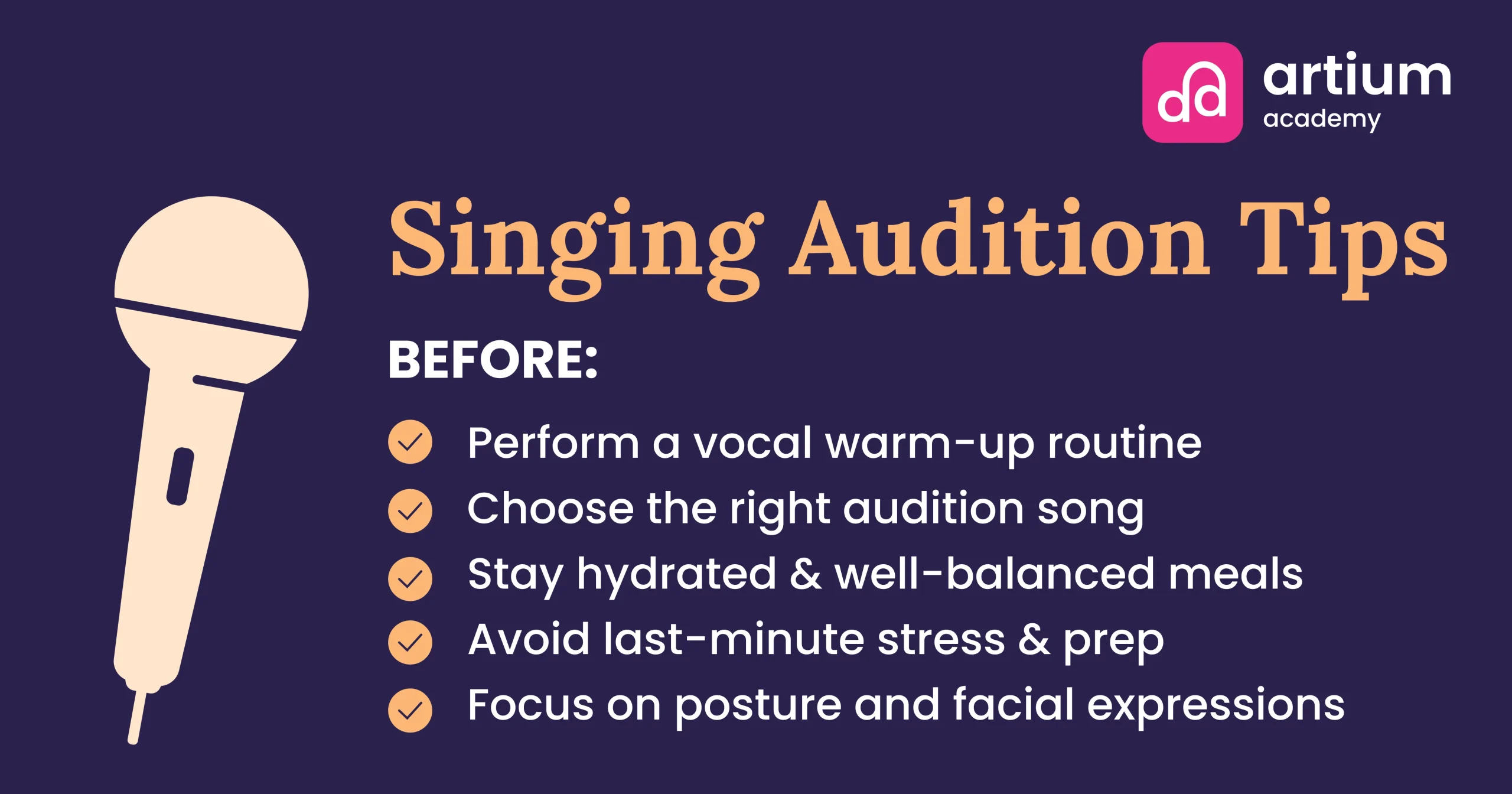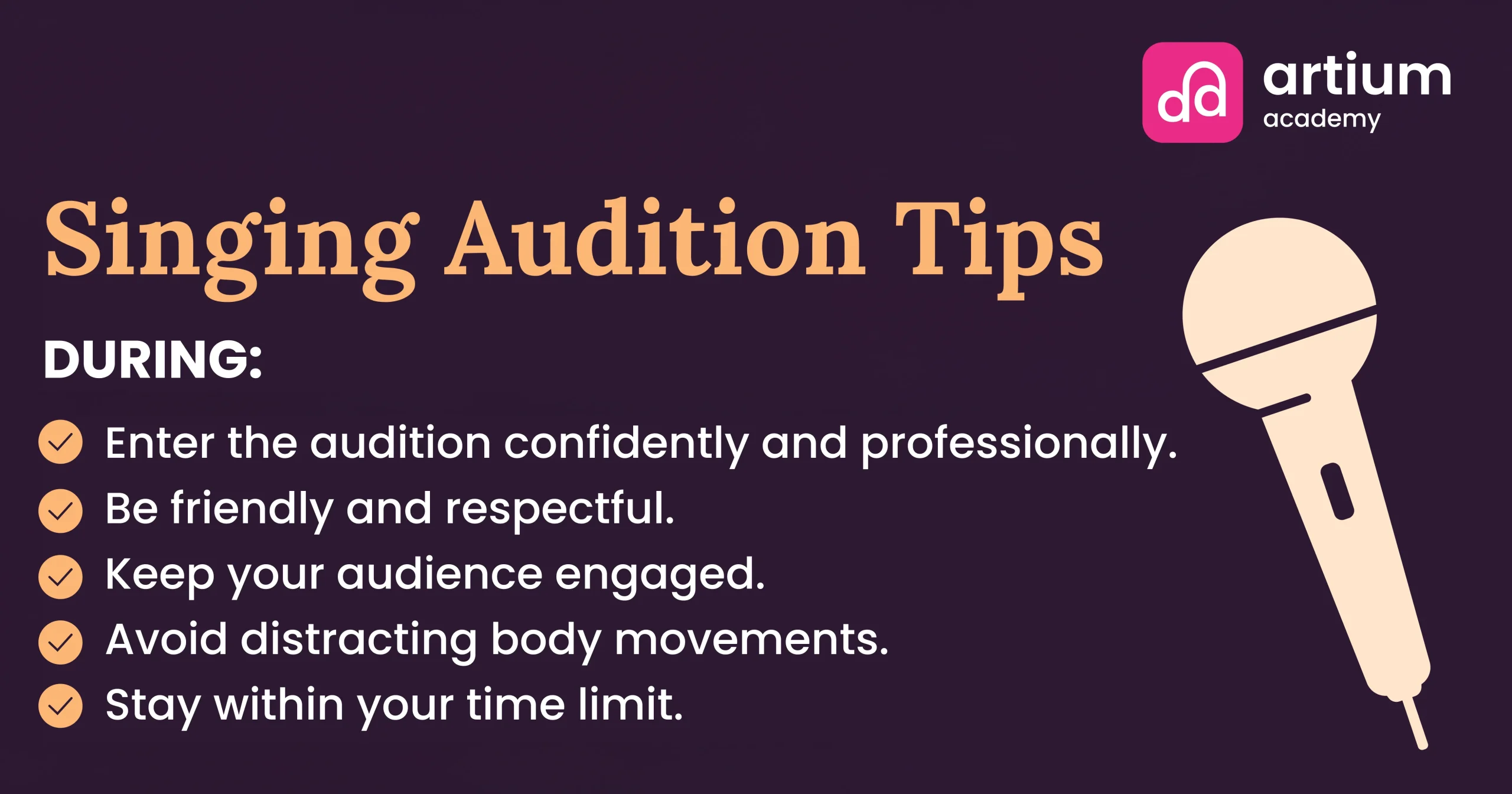All Topics
- Alchemizing Music Concepts for Students
- Artist Spotlight
- artium gift card
- Artium Maestros
- Artium News
- buying guide
- Carnatic Music
- Devotional Music
- Editorials by Ananth Vaidyanathan
- Film Music
- Guitar
- Hindustani Classical Music
- Indian Classical Music
- Indian Folk Music
- Insights
- Instruments
- Karaoke Singing
- Keyboard
- Kids Music
- maestros
- Music Education
- Music for Kids
- Music Industry
- Music Instruments
- Music Legends
- Music Theory
- Music Therapy
- Piano
- piano guide
- Success Stories
- Tamil Film Music
- Telugu Film Music
- Time Theory
- Tools
- Uncategorized
- Vocal Singing
- Vocals
- western classical music
- western music
- Western vocal music
Music Education, Western vocal music
16 Tips to Prepare for Your Singing Auditions
16 Tips to Prepare for Your Singing Auditions

Table of Contents
Taking on a singing audition is among the hardest hurdles for any aspiring singer.
Auditions are the singer’s stage-side job interviews, equal parts thrill and challenge, no matter how many you’ve faced. Nail the art of vocal auditioning, and each performance becomes a golden ticket to gigs that amplify your singing career.
In today’s dynamic music universe, the proper spotlight can transform your journey overnight. Iconic shows like Indian Idol, Sa Re Ga Ma Pa, The Voice India, The Rising Star, My Kind of Country, and American Idol are constantly on the lookout for fresh voices. A polished, well-prepared singing audition can be your golden ticket to that STAGE.
Whether you’re just starting out or already an experienced vocalist, this article will disclose key tips to help you shine at your next singing audition and capture the attention of top music directors.
What Should You Know Before Going for Your Singing Auditions?
In a singing audition, it’s not just about your voice, but also about a harmonious blend of other factors that come into play. Beyond skill, a truly successful audition requires the three “P’s” to shine as one: practice, preparation, and presentation.

Think of it as a beautiful melody—each note must be in place for the whole to be perfect. Your raw talent is the song itself, but you must devote yourself to practicing your instrument and voice with unwavering discipline.
Before you even step on the stage, you must take the time to prepare your thoughts, your words, and your composure. And finally, you must present your performance with confidence and precision before the judges. This trinity of “P’s” is the silent chorus behind every outstanding performance, and they are just as crucial to a captivating audition as the skill itself.
Practicing proper breathing exercises for singers is a key part of your journey, helping to build a strong foundation. These exercises are the first step in your vocal warm-ups, ensuring your instrument is ready to perform.
By consistently working on your breath control, you’ll find that your vocal range expands, allowing you to hit those high notes with ease and sustain powerful phrases. This is a crucial element that you can master through dedicated online music lessons, where expert guidance helps you refine every aspect of your technique.
How to Pick An Ideal Song for Your Singing Audition?
Preparing for vocal auditions is about more than just your singing talent. To truly stand out, you need to be strategic about the songs you choose. The ideal song should highlight your vocal strengths, demonstrate your range, and perfectly align with the character or style you’re auditioning for.

A key part of how to prepare for a singing audition is to first understand the context of the production, including its genre, time period, and themes. This background knowledge is crucial for selecting a song that helps casting directors envision you in the role.
An ideal song choice should do three key things for you:
- Highlight your strengths: It should be a vehicle for what you do best.
- Showcase your range: It must demonstrate the full capability of your voice.
- Capture the essence of the role: It needs to help the judges see you as the character you’re auditioning for.
When considering the best songs for auditions, remember that uniqueness can be your greatest asset. While it’s vital to showcase your abilities, try to avoid overly popular or overdone songs that judges may have heard countless times. Instead, look for hidden gems or lesser-known tracks that still fit the mood and requirements of the audition.
By doing so, you demonstrate creativity and originality in the singing audition, which can leave a lasting impression on the audition panel and help you stand out from the crowd.
16 Tips to Remember While Preparing For Singing Auditions
Sometimes a singing audition is just the beginning; one round may lead straight into another the same day, or you might get a “callback,” returning later to perform precisely what the judges request. Whatever the format, being ready is key to a successful audition.

Check out these tips before your music auditions. We’ll walk you through every step, from music preparation and vocal warm-ups to calming those last-minute nerves, so you’re fully prepared when it’s time to shine.
1. No Last-Minute Prep
Years of steady practice, not an all-nighter, build the skill and confidence you need. Keep honing daily so you’re ready when opportunity knocks. Building your confidence and mental preparedness is all about thorough rehearsal and preparation. The more you study and practice your material, the more confident you’ll feel walking into that audition room.
2. Nervous Mean You Care
A few butterflies show passion, not weakness. Breathe deeply and let that energy fuel your performance at your singing audition.
3. Stay Hydrated
Your voice performs best when your body is consistently hydrated. Start increasing your water intake 48 hours before the audition and sip small amounts throughout the audition day rather than guzzling at the last minute. Make sure to carry a water bottle and avoid icy water right before singing; room-temperature water is usually the best way to keep the throat relaxed.
4. Prioritize Sleep
A good night’s sleep matters for vocal coordination, breath control, and focus. Aim for 7–9 hours whenever possible so your body and voice are rested on audition day. Poor sleep can make it harder to hit pitches and control dynamics, so treat sleep as part of your audition preparation routine.
5. Protect Your Voice
Avoid excessive talking, cheering, or singing loudly before your audition so you don’t strain your voice. Light, gentle vocal exercises are fine (brief humming, lip trills, gentle scales), but make sure you don’t overdo warm-ups right up to your turn. Plan your warm-up timing so your voice feels ready when you step in front of the panel.
6. Choose the Right Song
Choose a song that showcases your strengths and fits your vocal range, not just something flashy. Pick material that lets you demonstrate phrasing, tone, and control so the panel can hear your skills clearly. For musical theatre auditions, choose a contrasting contemporary or classical piece; for pop auditions, select a song that highlights tone and stylistic feel.
Remember: a simple song sung with excellent technique and musicality often makes a stronger impression than an overly burdensome number performed inconsistently.
7. Simple Can Shine
Prepare one main music audition song and at least one backup audition song in a different key or style so you can show range and adaptability if asked. Make sure you know the melody and words inside out, and practice sections that showcase your best range and dynamics. Spend rehearsal time polishing the opening 8–16 bars; that first impression matters to judges.
8. Dress for Ease
Comfort equals confidence: Avoid tight clothes or outfits that make you self-conscious. Choose breathable layers and comfortable shoes so you can move and breathe freely on stage. What you wear should support your performance, not distract from it.
9. Watch Your Diet
Avoid heavy, spicy, or fried foods and excessive caffeine in the 24 hours before your audition; many singers also choose to limit dairy if it increases mucus for them. Instead, eat light, well-balanced meals and take care to stay hydrated (see hydration tips). If you have specific concerns about food and phlegm, consult your voice teacher or a medical professional for personalized advice.
10. Stay Lightly Active
Staying active in the hours before your audition helps clear excess adrenaline and keeps your mind focused. Choose gentle activities such as light walking, short reading breaks, or quiet stretching- that don’t tire your body or strain your voice. Time these activities so you arrive at the audition space calm and centered, not breathless or overheated.
11. Warm Up Well
- Walk 8–10 minutes at an easy pace to release tension
- Do breathing and vocal exercises for 4–6 minutes—try box breathing (4-4-4) followed by gentle lip trills and humming to wake up the voice
- Spend 2–3 minutes visualizing your opening bars and the way you’ll enter the space
- See the judges, feel the timing, and imagine delivering your best performance
Simple exercises like deep breathing, meditation, and progressive muscle relaxation can help you find a sense of calm, ensuring you step on stage feeling centered and ready to perform.
12. Know Your Song Well
Be certain you know the lyrics and melody inside out. Practice your opening 8–16 bars until you can start confidently; first impressions matter to judges and set the tone for the whole performance. Rehearse the song at the exact tempo and key you’ll use in the audition so your body learns the timing and your skills translate under pressure.
Rejection is a natural part of the audition process, so it’s important not to let it discourage you. The key is to maintain a positive attitude and keep moving forward, no matter the outcome.
13. Have a Backup Song
Have an audition song backup ready, a different key or contrasting style, so you can display range and adaptability if the panel asks for something else. Keep backup choices short (30–60 seconds) and practiced at performance quality; a polished short excerpt often scores better than an unfamiliar full song.
14. Visualize Success
Visualize your performance before you go onstage, see the room, the judges, and the way you’ll deliver the first phrase. Spend a few calm minutes imagining success; this builds confidence and reduces anxiety, so your performance feels natural and musical. Make sure to cue a short affirmation or breathing pattern that centers you right before you enter.

15. Arrive Early
Give yourself time to settle in the audition space, check the acoustics, practice a quiet run-through if allowed, and get comfortable with the stage dimensions. Arriving early reduces last-minute stress and helps you make a calm impression on the judges and people running the auditions. Also, pay attention to posture and facial expressions during your performance; these nonverbal cues help convey confidence and musical intent.
16. After The Singing Audition
If appropriate, ask for brief feedback and make notes on what you felt went well or what you want to improve. Use each audition as practice—track times, repertoire choices, and judges’ reactions so you can refine your preparation process for next time. Taking care to reflect, auditions become stepping stones for a stronger singing career.
Why Are Singing Auditions Your Pathway to Success?
A singing audition isn’t just a performance; it’s your first step toward stardom. It’s a powerful motive that offers far more than just a stage. Many of the most successful artists today launched their careers by seizing audition opportunities. It’s important to understand why these moments are so important and how to make the most out of them.
- Nationwide Visibility: Auditions put you in the spotlight, allowing you to be discovered by renowned music directors and industry professionals who can propel your career forward.
- Career Opportunities: A stellar audition can open doors to incredible opportunities, from live concerts and TV reality shows to even landing a record deal.
- Skill Enhancement: Every audition is a chance to receive valuable feedback from experts, helping you refine your skills and become a better vocalist.
Online Or Offline Singing Auditions?
With today’s technology, you have the freedom to take vocal auditions in a way that suits you best, whether from the comfort of your home or on a live stage.
- Online Singing Auditions: If convenience is your priority, online auditions are perfect. You can perform from anywhere, and many platforms offer a simple registration process.
- Offline Singing Auditions: For those who thrive on the energy of a live audience, offline auditions offer a chance to feel the spotlight and connect directly with the judges.
Pro Tip: Always choose a reputable platform that offers free registration and has no hidden fees to avoid scams.
Before You Take The Leap: Sharpen Your Singing or Vocal Skills at Artium Academy
Choosing the right music genre is like finding your real voice. If you’re looking to take your vocal auditions to the next level, it’s essential to not only master your preferred style but also to explore others. Understanding different genres is like having a map to the world of music, equipping you to navigate with confidence and ease. Each genre is a new path to inspire you, and embracing this rich diversity is a key part of your journey to become a well-rounded performer.
At Artium Academy, we are passionate about helping you learn to sing and discover your unique musical path. Our singing classes for beginners cover everything from the structured details of Indian classical singing online to the dynamic freedom of learning Western vocals online. We ensure your experience is both fulfilling and fun. So, go ahead and follow your curiosity; there’s always something new to learn, love, and master.
We can’t wait to support you every step of the way. Book your free 1:1 trial now.
FAQs on How to Prepare for Singing Auditions
Prepare for a singing audition with steady practice, not last-minute cramming. Warm up your voice, stay hydrated, and get a good night’s sleep. Choose a song that showcases your vocal range and learn it thoroughly, along with a backup song ready. Avoid straining your vocals or eating heavy, spicy foods. Arrive early, breathe, and visualize a confident performance to keep nerves in check and let your talent shine.
Before a singing audition, avoid straining your voice by talking or singing too much, wearing tight or uncomfortable clothes, and eating spicy, fried, or dairy-heavy foods that can irritate your throat. Skip excessive caffeine to stay hydrated and get a whole night’s sleep. Steer clear of last-minute worries and instead rely on steady practice. Keeping calm and rested ensures your vocals and confidence shine during the performance.
- Practice consistently, auditions need long-term prep, not last-minute work
- Warm up your voice with gentle scales and humming
- Stay hydrated and avoid spicy, fried, or dairy foods
- Get a full night’s sleep before audition day
- Choose a song that flatters your vocal range and style
- Memorize lyrics and melody thoroughly; have a backup song ready
- Arrive early to relax and familiarize yourself with the space
Vocal Technique – Pitch accuracy, breath control, and overall tone quality.
Musicality – Expression, dynamics, and ability to interpret the song.
Stage Presence – Confidence, connection with the audience, and charisma.
Originality – Unique style or personal touch that sets you apart.
Preparation – Memorized lyrics, polished performance, and professionalism.
Here are key ways to steadily improve your singing voice:
- Warm-ups & Breathing: Start every session with gentle vocal warm-ups and practice diaphragmatic breathing for better support and control.
- Regular Practice: Sing daily—scales, songs, and exercises build strength and consistency.
- Good Posture & Hydration: Stand tall, stay hydrated, and avoid strain to keep your vocal cords healthy.
- Ear Training: Work on pitch recognition with a piano or tuning app to sharpen accuracy.
- Professional Guidance: Take music lessons or online music classes to get tailored feedback and correct incorrect habits early.
Begin with gentle humming or lip trills to loosen vocal cords. Follow with light scales on “ah” or “ee,” gradually increasing range and volume. Add sirens or glides to smooth transitions between registers. Practice breathing exercises, slow inhales, and controlled exhales, for breath support. Stay hydrated and keep the warm-up relaxed to avoid strain, aiming for 10–15 minutes to ready your voice for a strong, confident audition performance.
Keep it concise, usually 1–2 minutes or about 16–32 bars, unless the panel requests more.
Breathe deeply, be an optimist, visualize success, warm up well, and focus on enjoying the song rather than the audience.
Look for reality shows, music schools, online casting calls, local talent competitions, and community theatre or choir auditions.
Artium Academy is your go-to place to learn and master your vocals in the online music classes. The 1:1 sessions will help you to explore your potential and progress slowly.







